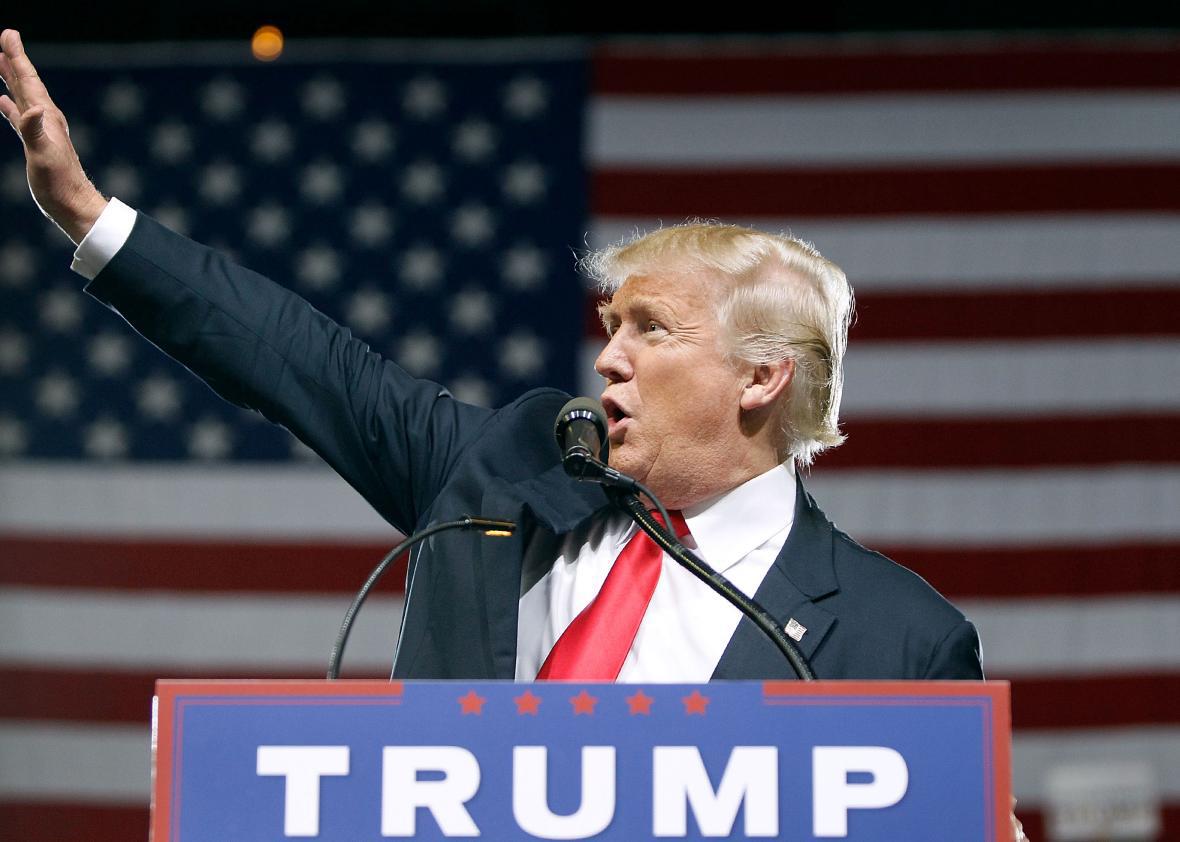Donald Trump just got done giving a speech, staged appropriately in front of a pile of recycled trash, about the evils of trade. This has, of course, been one of his consistent campaign themes—that incompetent (or possibly courrupt) U.S. politicians (especially Bill and Hillary Clinton) have sold out U.S. workers in one bad trade deal after another, and that only he, Donald Trump, is willing to stand up for the interests of American blue-collar workers. (He even had a charming, seemingly ad libbed aside in this speech about how presidents after him might go back to mucking things up.)
Because, like an elephant, the internet never forgets, some writers have been having fun remembering the days when Trump wasn’t so sour on the idea of sending jobs overseas. NBC’s Alex Seitz-Wald pulled up this 2005 gem from the Trump University blog, titled, “Outsourcing Creates Jobs in the Long Run.”
It reads:
We hear terrible things about outsourcing jobs—how sending work outside of our companies is contributing to the demise of American businesses. But in this instance I have to take the unpopular stance that it is not always a terrible thing.
I understand that outsourcing means that employees lose jobs. Because work is often outsourced to other countries, it means Americans lose jobs. In other cases, nonunion employees get the work. Losing jobs is never a good thing, but we have to look at the bigger picture.
Last year, Nobel Prize-winning economist Dr. Lawrence R. Klein, the founder of Wharton Econometric Forecasting Associates, co-authored a study that showed how global outsourcing actually creates more jobs and increases wages, at least for IT workers. The study found that outsourcing helped companies be more competitive and more productive. That means they make more money, which means they funnel more into the economy, thereby, creating more jobs.
I know that doesn’t make it any easier for people whose jobs have been outsourced overseas, but if a company’s only means of survival is by farming jobs outside its walls, then sometimes it’s a necessary step. The other option might be to close its doors for good.
Now, to be fair to Trump, he was railing about foreign countries taking advantage of the U.S. in trade since way back in the 1980s. Maybe his affection for outsourcing was just a momentary lapse of judgment. Or maybe he’s just more comfortable with IT firms sending jobs overseas than manufacturers. Who knows.
But it does add to the sense that his opinions on globalization can be a bit mushy, or, you know, hypocritical. Before he was praising Brexit, he once wrote a Davos-pegged op-ed for CNN praising Europe and saying that we’d have to “leave borders behind and go for global unity when it comes to financial stability,” whatever that meant. There’s the fact that the anti-immigration demagogue and friend of the American worker happily uses seasonal guest workers at his Florida golf clubs (he says he can’t find qualified Americans to work short term, which seems like a fairly weak excuse). Then there are his clothing lines, which are of course made overseas. He says it’s difficult to have apparel manufactured here (that’d be true, if he added the words “cheaply” to the end of that sentence). Add it all up, and you get the impression the man might not have cared all too deeply about the plight of middle-class wage earners until recently. Perhaps we should start calling him a born-again protectionist.
